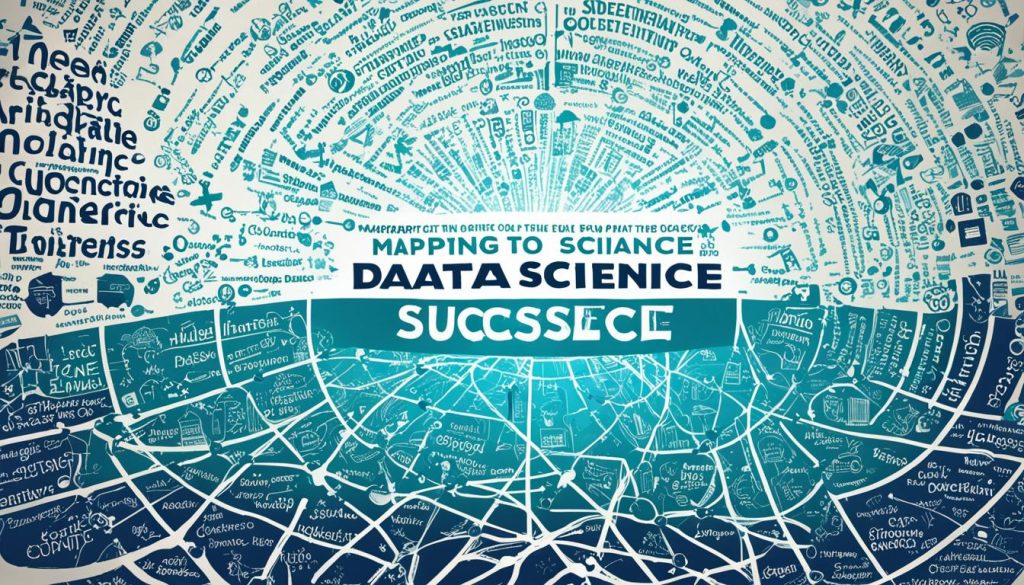Becoming a data scientist can open up a world of exciting career opportunities in the field of data science. This profession is in high demand, and individuals with the right skills and qualifications can thrive in the ever-evolving world of data analysis and interpretation.
In this article, we will guide you through the essential steps to embark on a how to become a data scientist. Whether you are just starting or looking to make a career transition, understanding the requirements and skills needed to become a data scientist is crucial.
By following these essential steps, you will be well on your way to pursuing a fulfilling and prosperous career in data science. Let’s dive in!
Discovering the Data Science Profession
When it comes to navigating the world of data analysis and making data-driven decisions, the data science profession plays a pivotal role. Data scientists are the experts who harness the power of mathematics, statistics, and computer science to derive meaningful insights from large and complex datasets.

As the demand for data analysis continues to grow exponentially, so does the need for skilled professionals who can effectively extract valuable information from data. Data scientists are equipped with the knowledge and skills to perform advanced statistical analyses, build predictive models, and uncover patterns that can drive significant business outcomes.
Unlike data analysts, who focus on interpreting and reporting data findings, data scientists go beyond and uncover deeper insights by employing cutting-edge technologies and algorithms.
Furthermore, data scientists are proficient in a variety of programming languages such as Python, R, and SQL, enabling them to manipulate, clean, and organize data efficiently. They possess the ability to extract key information from large, unstructured datasets and transform them into actionable recommendations for businesses and organizations.
By utilizing their expertise in data analysis, data scientists help businesses optimize their processes, identify new opportunities, and mitigate risks. Their insights serve as a foundation for making data-driven decisions, enabling organizations to stay competitive in today’s data-rich landscape.
Data Science Eligibility Requirements
To become a data scientist and excel in this rapidly growing field, there are certain eligibility requirements that aspiring professionals need to fulfill. These requirements set the foundation for a successful career in data science.
One of the primary eligibility requirements for entering the field of data science is obtaining a data science degree or a degree in a related field. Pursuing an undergraduate degree in computer science, mathematics, statistics, or any other quantitative field provides a strong academic background and equips individuals with the necessary knowledge and skills.
While a data science education through a degree program is crucial, it is also beneficial to enhance technical skills and gain practical experience. Data scientists need to be proficient in programming languages such as Python or R and have a deep understanding of statistical analysis and machine learning algorithms. Taking additional online courses or participating in coding bootcamps can help individuals refine their skills.
Acquiring relevant data science certification is another valuable step in seeking eligibility as a data scientist. These certifications demonstrate proficiency in specific areas of data science and can enhance job prospects and credibility in the industry. Popular data science certifications include Certified Analytics Professional (CAP) and Data Science Council of America (DASCA) certifications.
Furthermore, considering a master’s degree in data science or a related field can provide individuals with advanced knowledge and specialized expertise. While a master’s degree is not always a strict eligibility requirement, it can significantly enhance career opportunities and help individuals stand out in a competitive job market.
It’s important to note that data science is a constantly evolving field, and staying up to date with the latest industry trends and technologies is essential. Continuous learning and professional development through attending conferences, participating in webinars, or joining online communities can contribute to a data scientist’s professional growth.
By fulfilling these eligibility requirements, aspiring data scientists can position themselves for success and build a solid foundation for a rewarding career in this dynamic field.

Fostering Key Data Science Skills
Fostering key data science skills is essential for success in this field. Data scientists require a combination of technical expertise, analytical mindset, and effective communication skills. In this section, we will explore some of the key skills that are vital for aspiring data scientists.
1. Programming Languages: Proficiency in programming languages is fundamental for data scientists. Two popular languages used in data science are Python and R. Python is known for its versatility, simplicity, and extensive libraries for data analysis, while R is renowned for its statistical capabilities. Having knowledge of these languages enables data scientists to efficiently handle, analyze, and manipulate large datasets.

2. Statistical Analysis: Data scientists must possess a solid understanding of statistical analysis techniques. This knowledge allows them to explore datasets, identify patterns, and draw meaningful insights. Proficiency in statistical concepts such as probability, hypothesis testing, and regression analysis equips data scientists with the tools to make data-driven decisions.
3. Machine Learning: Machine learning is a core aspect of data science. Data scientists need to have a strong foundation in machine learning algorithms and techniques. This includes understanding concepts such as supervised learning, unsupervised learning, and reinforcement learning. By applying machine learning algorithms, data scientists can build predictive models and make accurate predictions from data.
4. Data Visualization: Effective data visualization is crucial for conveying complex information in a visual and accessible manner. Data scientists should be proficient in using tools such as Tableau, Power BI, or Python libraries like Matplotlib and Seaborn. By creating compelling visualizations, data scientists can present their findings effectively and facilitate data-driven decision-making.
5. Transferable Skills: In addition to technical skills, data scientists should also possess excellent communication, problem-solving, and collaboration skills. Effective communication allows them to explain complex concepts to non-technical stakeholders, while problem-solving skills help in identifying and resolving issues during data analysis. Collaboration skills enable data scientists to work as part of a team and leverage diverse perspectives to tackle complex problems.
Fostering these key data science skills is crucial for individuals aspiring to become successful data scientists. By honing their technical expertise and developing effective communication and problem-solving skills, aspiring data scientists can position themselves for rewarding career opportunities in the rapidly growing field of data science.
How to Become a Data Scientist?
Become a successful data scientist by following these key steps throughout your data science career journey. From the job search process to resume preparation, networking, and interview preparation, each step is crucial for achieving your goals.
To start, define your career objectives and set clear goals. Understand the skills and qualifications required for data science roles, and tailor your resume to highlight your relevant experience and expertise. By showcasing your skills and achievements, you can increase your chances of getting noticed by potential employers.
Building an online presence is essential in today’s digital age. Create a professional LinkedIn profile and showcase your projects on platforms like GitHub or Kaggle. This will not only help you establish credibility within the data science community but also increase your visibility to recruiters and hiring managers.
Networking is another important aspect of advancing your data science career. Attend industry events, webinars, and conferences to connect with professionals in the field. Engage in discussions, ask questions, and seek mentorship from experienced data scientists. Building a strong network can open doors to new opportunities and provide valuable insights.
Researching companies and specific data science positions is crucial before applying. Understand the industry trends, technologies, and challenges that companies are facing. Tailor your applications and cover letters to align with the needs of potential employers, showcasing your ability to solve their unique problems.

Finally, prepare for interviews by practicing technical and behavioral questions. Brush up on your coding skills, algorithms, and statistical concepts. Be prepared to showcase your problem-solving abilities and demonstrate how you have applied data science techniques in real-world scenarios. Confidence and effective communication skills are key during the interview process.
Remember, becoming a data scientist requires continuous learning and perseverance. Stay updated with the latest tools and technologies in the field. Take online courses, participate in data science challenges, and join online communities to enhance your knowledge and skills.
By following these steps and investing time in your professional development, you can position yourself for success in the dynamic and rewarding field of data science.
Achieving Proficiency: Data Science Online Courses
To become a skilled data scientist, it is essential to gain proficiency in the field. One effective way to achieve this is through data science online courses. These courses offer a wide range of educational opportunities and resources that can enhance your knowledge and skills in data science.
One of the key advantages of data science online courses is the flexibility they provide. Unlike traditional classroom settings, online courses allow you to learn at your own pace and fit your studies around your existing commitments. This flexibility is particularly beneficial for individuals who are working or have other personal commitments.
Another advantage of online courses is the access to industry experts. These courses are often taught by experienced professionals in the field of data science who can provide valuable insights and guidance. Their expertise can help you gain a better understanding of the practical applications of data science and its relevance in various industries.
Data science online courses also offer hands-on experience through projects. These projects give you the opportunity to apply the theories and concepts you’ve learned in real-life scenarios. By working on meaningful projects, you can develop the practical skills needed to succeed as a data scientist.
When considering data science online courses, it’s important to explore reputable online learning platforms that offer such courses. Platforms like Coursera, edX, and Udacity provide a wide range of data science courses from beginner to advanced levels. These platforms often collaborate with top universities and industry professionals to ensure the quality and relevance of the courses they offer.
In addition to online courses, data science bootcamps can be a great option for intensive and immersive learning. Bootcamps offer a condensed curriculum that focuses on practical skills and industry-relevant projects. They can provide you with an intensive learning experience and help you gain proficiency in a relatively short period.
Lastly, to further enhance your skills and increase your chances of employability, it’s crucial to consider data science internships. Internships provide valuable hands-on experience and allow you to apply your knowledge in real-world scenarios. They also offer networking opportunities and the chance to learn from experienced professionals in the field.
Navigating Data Science Certification
Obtaining a data science certification is a significant step towards building a successful career in this rapidly evolving field. With the increasing demand for skilled data scientists, certifications can provide professionals with a competitive edge and industry recognition.
There are various data science certification programs available that cater to different skill levels and career aspirations. These certification programs offer comprehensive training and assessment to ensure proficiency in key data science concepts and techniques.
Industry-recognized certifications are highly regarded and widely accepted in the job market. They validate a candidate’s knowledge and skills in data science and demonstrate their commitment to professional development. Some popular industry-recognized certifications include:
- Data Science Council of America (DASCA) – Offers the Certified Data Scientist (CDS) certification program, providing a comprehensive curriculum and rigorous examination to assess proficiency in data science.
- Microsoft Certified: Azure Data Scientist Associate – Focuses on the practical application of data science techniques using Microsoft Azure technologies.
- SAS Certified Data Scientist – Validates proficiency in using SAS software for data analytics and machine learning.
Aside from industry-recognized certifications, there are specialty certifications available for professionals looking to specialize in specific areas of data science. These certifications cater to niche domains and provide in-depth knowledge and skills required for specialized roles. Some examples of specialty certifications include:
- Certified Big Data Professional (CBDP) – Designed for professionals specializing in big data analytics and processing.
- Certified Machine Learning Engineer (CMLE) – Focuses on the practical application of machine learning algorithms and techniques.
- Certified Deep Learning Engineer (CDLE) – Validates expertise in deep learning techniques and neural networks.
When considering data science certification programs, it is essential to research and select certifications that align with your career goals and employer requirements. Look for programs that offer comprehensive curriculum, hands-on experience, and reputable accreditation. Additionally, consider the cost, duration, and flexibility of the certification program to ensure it fits with your schedule and budget.
A data science certification can open up numerous opportunities and enhance your professional growth in this thriving field. By earning industry-recognized certifications or specialty certifications, you can establish your expertise and credibility as a data scientist, making you a sought-after candidate in the job market.
Data Scientist Average Salary in India
When considering a career in data science, one of the important factors to consider is the average salary in India. Data scientists are in high demand due to the increasing reliance on data-driven decision-making in various industries. As a result, data scientists enjoy competitive salaries that reflect the value they bring to organizations.
The average salary of a data scientist in India can vary based on several factors. These factors include:
- Experience: Like in any profession, experience plays a significant role in determining salary levels. As data scientists gain more knowledge and expertise through practical work, their earning potential increases.
- Education: A strong educational background is highly valued in the data science field. Obtaining advanced degrees or certifications in relevant disciplines can positively impact salary expectations.
- Location: Salary levels can differ based on the location within India. Metropolitan cities like Bengaluru, Delhi, and Mumbai tend to offer higher salaries due to the concentration of data science opportunities.
- Industry: Different industries have varying levels of demand for data scientists. Sectors such as finance, healthcare, and technology often offer higher salaries to attract top talent.
It’s essential to stay updated with the current data science job market in India to understand salary ranges and trends. Organizations that heavily rely on data are constantly seeking skilled data scientists, driving salary growth. By monitoring market trends and staying aware of salary factors, aspiring data scientists can better negotiate their compensation packages.
Conclusion
The data science profession offers a promising career path for those seeking a challenging and fulfilling role in the field of analytics. Becoming a data scientist requires a combination of skills, education, and experience. Through this article, we have explored the essential steps to embark on a successful data scientist career.
If you are passionate about leveraging data to make a difference in organizations and possess the necessary skills and education, embarking on a data scientist career can be an excellent choice. By continuously honing your skills and staying updated with industry trends, you can thrive and make a significant impact in the thrilling world of data science.
FAQs
How is data science different from data analysis?
Data science involves a broader approach, utilizing advanced techniques such as machine learning and statistical modeling, while data analysis focuses on extracting insights from data through various statistical and visual methods.
How can data science online courses help in acquiring proficiency?
Data science online courses offer flexibility, self-paced learning, access to industry experts, and hands-on experience through projects, which contribute to achieving proficiency in this field. Data science bootcamps and internships are also valuable options.
What factors influence a data scientist’s salary in India?
Factors influencing data scientist salaries in India include experience, education, location, and industry. These factors can vary significantly, leading to a wide range of salary levels.
Why should I consider a career in data science?
Data science is a dynamic and rewarding industry with a growing demand for professionals. Acquiring key skills and education in this field can lead to exciting job opportunities and competitive salaries.




